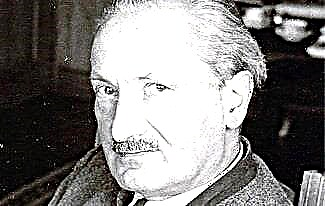Any creativity is a part of an inexplicable miracle. Why do thousands of people draw, while Ivan Aivazovsky took an hour to paint a trivial but unique seascape? Why are thousands of books written about any war, while “War and Peace” is obtained by Leo Tolstoy, and “In the Trenches of Stalingrad” only by Viktor Nekrasov? To whom and when does this divine spark, which we call talent, come? And why is this gift so selective sometimes? Mozart, most likely, was one of the most ingenious people who walked on our land, and what did genius give him? Endless intrigues, squabbles and an everyday battle for a piece of bread, by and large, lost.
On the other hand, studying the biographies of famous composers, the facts from the life of which will be discussed below, you understand that nothing human is alien to them to a much greater extent than to ordinary people. Almost every composer in his biography has no, no, and even slips “fell in love with the wife of his patron” (that is, a person who is banal or did not let you die of hunger or save you from having to rewrite notes for 12 hours a day), “fell in love 15 -year-old daughter of Princess NN ”, or“ met a talented singer XX, who, unfortunately, loved money too much ”.
And it would be fine if it was about the customs of the eras. But at the same time as the musicians, who were robbed to the skin by life companions and creditors, there were their colleagues who capitalized their talent relatively comfortably, causing the envy of those around them. Jean-Baptiste Lully, even after the "Sun King" lost interest in him, led the life of a prosperous, albeit sick, rich man. Many times cursed by rumor, but innocent of the death of Mozart, Antonio Salieri ended his life in a wealthy old age. Young Italian composers still receive the Rossini Prize. Apparently, the composer's talent needs an ordinary everyday frame of common sense and experience.
1. The history of world opera began with Claudio Monteverdi. This outstanding Italian composer was born in 1567 in Cremona, the city where the famous masters Guarneri, Amati and Stradivari lived and worked. Already at a young age, Monteverdi showed a talent for composition. He wrote his opera Orpheus in 1607. In a very meager dramatic libretto, Monteverdi managed to put deep drama. It was Monteverdi who was the first to try to express the inner world of a person through music. To do this, he had to use a lot of tools and prove himself to be an outstanding master of instrumentation.

2. The founder of French music Jean-Baptiste Lully was Italian by origin, but Louis XIV liked his work so much that the sun king appointed Lully “music superintendent” (now the position would be called “minister of music”), elevated him to the nobility and showered him with money ... Alas, even the great kings have no power over fate - Lully died of gangrene, having been pricked with a conductor's stick.
3. The genius Antonio Vivaldi, as you know, died in poverty, his property was described for debts, and the composer was buried in a free grave for the poor. Moreover, most of his works were lost for a long time. Only in the 1920s, professor of the Turin Conservatory Alberto Gentili, who had been searching for Vivaldi's works all his life, discovered in the archive of the college of the San Martino monastery a huge number of vocalizations, 300 concerts and 19 operas by the great composer. Scattered manuscripts of Vivaldi are still found, and the selfless work of Gentile is the subject of the novel by Frederico Sardelia "The Vivaldi Affair".
4. Johann Sebastian Bach, without whose works even the primary education of a pianist is unthinkable, during his lifetime did not receive even a hundredth part of the current recognition as a composer. He, an excellent organist, constantly had to move from city to city. The years when Bach received a decent salary were considered a good period, and they did not find fault with the works that he wrote on duty. In Leipzig, for example, they demanded of him works that were not too long, not like an opera, and that they "arouse awe in the audience." In two marriages, Bach had 20 children, of which only 7 survived. Only 100 years after the death of the composer, thanks to the works of musicians and researchers, the general public appreciated Bach's talent.
5. During the years of the work of the German composer Christoph Willibald Gluck in Paris (1772 - 1779), a conflict broke out, which was dubbed "the war of Gluckists and Picchinists." The other side was personified by the Italian composer Piccolo Piccini. The dispute was simple: Gluck was trying to reform the opera so that the music in it obeys the drama. The supporters of traditional opera were against, but did not have the authority of Gluck. Therefore, they made Piccini their banner. He composed funny Italian operas and had never heard of any war before coming to Paris. Fortunately, Piccini turned out to be a healthy person and maintained warm relations with Gluck.
6. “Father of Symphony and Quartet” Joseph Haydn was desperately unlucky with women. Until the age of 28, he, mainly because of desperate poverty, lived as a bachelor. Then he fell in love with his friend's youngest daughter, but almost on the day when Haydn was about to ask her hand in marriage, the girl ran away from home. The father offered the musician to marry his eldest daughter, who was 32 years old. Haydn agreed and fell into bondage. His wife was a wasteful and quarrelsome woman, and, most importantly, she disdained her husband's musical pursuits, although they were the only income of the family. Maria could well have used the sheet music as wrapping paper or curlers. Haydn himself said in old age that she didn't care if she was married to an artist or to a shoemaker. Later, while working for Prince Esterhazy, Haydn met Antonio and Luija Polzelli, a violinist and singer married couple. Luigi was only 19 years old, but, apparently, she already had a rich life experience. She gave Haydn, who was already 47 years old, with her favor, but in return began to shamelessly pull money out of him. Popularity and prosperity came to Haydn even when they were, by and large, not needed.
7. The legend, popular in Russia, that Antonio Salieri poisoned Wolfgang Amadeus Mozart out of envy of his talent and success, was only known in Italy in the 1980s, when Peter Schaeffer's play Amadeus was shown in Italy. The play was staged based on the tragedy of Alexander Pushkin "Mozart and Salieri" and caused a storm of indignation in Italy. Gossip about the conflict between Mozart and Salieri appeared during the latter's life. Salieri, at the most, was attributed to intrigues and intrigues. But even these rumors were based on only one letter from Mozart to his father. In it, Mozart complained wholesale and retail about all the Italian musicians who worked in Vienna. The relationship between Mozart and Salieri was, if not fraternal, then quite friendly, they gladly performed the works of the “rival”. In terms of success, Salieri was a recognized composer, conductor and teacher, a wealthy person, the soul of any company, and not at all a gloomy, calculating misanthrope. Mozart, living penniless, mired in disorderly relationships, unable to arrange his works, should rather have envied Salieri.

8. The creator of the light-haired choir concert Dmitry Bortnyansky, while studying in Italy, was mobilized to help the Motherland. Count Alexei Grigorievich Orlov, who arrived in Venice at the time when Dmitry Stepanovich Bortnyansky was there, involved the composer in secret negotiations with the Italian consul Marutsi. Bortnyansky negotiated with such success that Orlov introduced him to high society. Bortnyansky made a brilliant career, rising to the rank of actual state councilor (major general). And “If our Lord is glorious in Zion,” he wrote before receiving the rank of general.
9. Father Ludwig van Beethoven passionately wanted his son to follow in the footsteps of Mozart. The singer of the court chapel studied with a little boy for several hours a day. Sometimes, to the horror of his mother, he also arranged night lessons. However, after the first concert performance of his son, Johann Beethoven lost interest in his musical abilities. Nevertheless, the great attention paid to music affected Ludwig's general education. He never learned how to multiply numbers and knew very little German punctuation.
10. The legend that when Niccolo Paganini once began to break the strings of his violin, and he was able to complete his performance, playing only one string, there are two roots. In 1808, the violinist and composer lived in Florence, where he was a court musician for Princess Eliza Bonaparte, Napoleon's sister. For the princess, with whom Paganini had a rather passionate relationship, the composer wrote several works, among which was "Love Scene", written for two strings. The beloved quite logically demanded that the composer write something for one string. Paganini fulfilled her wish by writing and performing the Napoleon military sonata. Here, in Florence, Paganini was somehow late for the concert. In a great hurry, he went out to the audience without checking the tuning of the violin. The audience enjoyed listening to Haydn's “Sonata”, performed, as always, impeccably. It was only after the concert that it was discovered that the violin was tuned a whole tone higher than the piano - Paganini, in the course of his performance, changed the entire fingering of the Sonata.
11. Gioacchino of Russia, at the age of 37, was the most popular, wealthy and famous opera composer in the world. His fortune was numbered in the millions. The composer was called “Italian Mozart” and “The Sun of Italy”. At the height of his career, he stopped writing secular music, limiting himself to church tunes and teaching. Various explanations have been put forward for such a sharp departure of the great composer from creativity, but none of them finds documentary confirmation. One thing is certain: Gioacchino Rossini left this world, being much richer than his colleagues, who worked at the music stand to the grave. With the funds bequeathed by the composer, a conservatory was founded in the composer's hometown of Pesaro, prizes for young composers and librettists were instituted, and a nursing home was opened in where Rossini was very popular.
12. Franz Schubert was known during his lifetime as a songwriter based on verses by popular German poets. At the same time, he wrote 10 operas that did not see the stage and 9 symphonies that were never played by the orchestra. Moreover, hundreds of Schubert's works remained unpublished, and their manuscripts continued to be found decades after the death of the composer.
13. The famous composer and music critic Robert Schumann suffered from schizophrenia all his life. Fortunately, exacerbations of the disease occurred infrequently. However, if the illness began to manifest itself, the composer's condition became very grave. He made several attempts at suicide, after which he himself went to a psychiatric hospital. After one of these attempts, Schumann never left the hospital. He was 46 years old.
14. Franz Liszt was not admitted to the Paris Conservatory - it did not accept foreigners - and the French stage of the career of a composer and pianist began with performances in salons. Admirers of the talent of the 12-year-old Hungarian gave him a concert at the Italian Opera House, which had one of the best orchestras. During one of the numbers after the part in which young Ferenc played a solo, the orchestra did not enter on time - the musicians listened to the playing of a young virtuoso.
15. The famous opera "Madame Butterfly" by Giacomo Puccini took its current form far from immediately. The first performance of Madame Butterfly, which took place on February 17, 1904 at the Teatro alla Scala in Milan, failed. In two months the composer seriously reworked his work, and already in May, Madame Butterfly was a huge success. However, this was not Puccini's first experience in reworking his own works. Earlier, when staging the opera "Tosca", he inserted into it a whole newly written aria - the famous singer Darkla, who played the main role, wanted to sing her own aria, and got it.

16. Ludwig van Beethoven, Franz Schubert, famous Austrian composer Anton Bruckner, Czech composer Antonín Dvořák and another Austrian Gustav Mahler died just after finishing work on their Ninth Symphonies.
17. The so-called. The Mighty Handful was an association of Russian composers, which included Modest Mussorgsky, Alexander Borodin, Nikolai Rimsky-Korsakov and other progressive composers. The activities of the "Belyaevsky Circle" are much less known. But under the auspices of the famous philanthropist Mitrofan Belyaev, almost all Russian composers have been united since the 1880s. There were weekly musical evenings held, in modern terms. concert tours, notes were published on a truly industrial scale. Only in Leipzig, Belyaev published notes by Russian composers in excellent quality in the volume of 512 volumes, which cost him up to a million rubles. The Russian gold miner did not leave composers even after his death. The foundation and publishing house he founded were headed by Rimsky-Korsakov, Anatoly Lyadov and Alexander Glazunov.
18. The world famous operetta of the Austrian composer Franz Lehár “The Merry Widow” may well have not seen the light of day. The director of the Vienna theater “an der Wien”, in which Lehar staged his work, treated the play badly, even despite paying for rehearsals and performances. The sets and costumes were made from the available ones, they had to rehearse at night. It got to the point that on the day of the premiere, he offered to pay Lehar so that he would refuse the performance and not dishonor the theater with a vulgar play. The composer was already ready to agree, but the performers interfered, who did not want their work to be wasted. The show began. Already the first act was interrupted by applause several times. After the second one, there was a standing ovation - the audience called the author and the actors. Nothing hesitating, along with Lehar and the performers, the theater director went out to bow.
19. The Bolero, which has already become a musical classic by the French composer Maurice Ravel in the 20th century, is, in fact, a typical commissioned work. The famous dancer Ida Rubinstein in the 1920s demanded (what rights she had to demand from Ravel, history is silent) to orchestrate the work of the Spanish composer Isaac Albeniz “Iveria” for her dances. Ravel tried it, but quickly realized that it was easier for him to write the music he needed on his own. This is how “Bolero” was born.
20. At the beginning of his career, the author of “Silva” and “Circus Princess” Imre Kalman wrote “serious” music - symphonies, symphonic poems, operas, etc. The audience did not receive them too enthusiastically. By the Hungarian composer's own admission, he began to write operettas in spite of general tastes - they don't like my symphonies, I will condescend to write operettas. And then success came to him. Songs from the operettas of the Hungarian composer became street and tavern hits the day after the premieres. The operetta "Hollanda" has performed more than 450 performances in Vienna. a very rare case for composers: the Kalman family lived in Vienna in a real palace with an open house. accepting any guests every day.









